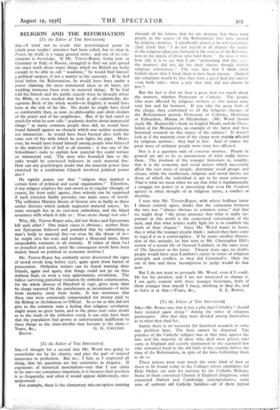RELIGION AND THE REFORMATION
[To the Editor of THE SPECTATOR] SIR,—I tried not to evade that psychological point to which your readers' attention had been called, but to clear it. Power, by itself, is a vague general term ; and one of its con- stituents is knowledge. If Mr. Trevor-Roper, living now in Germany or Italy or Russia, struggled to find out and spread the exact truth about many things which we British are lucky enough to .be able to call " academic," he would find himself a political suspect, if not a martyr to his curiosity. If he had lived before the Reformation, he would have been under a power claiming the most immaterial ideas as its basis, yet wielding immense force even in material things. If he had told his friends and the public exactly what he thought about the Bible, or even studied that book at all—admittedly, the supreme Book of the whOle world—in English, it would have been at the risk' of his life. No" doubt he might have lived as comfortably then, as now, in philosophic and silent disdain of the priest and of his neighbours. But, if he had cared as much for what he now calls " academic doubts about immaterial things " as many common people then did, he would have found himself against an obstacle which was neither academic nor immaterial : he would have been burned alive with the same sort of fire with which he now lights his pipe. More- over, he would have found himself among people who believed in the material fire of hell to all eternity : it was one of the Schoolman's tasks to explain how material fire could torture an immaterial soul. The men who hounded him to the stake would be , convinced believers in such material fire. How can any psychologist doubt that the material power thus exercised by a totalitarian Church involved political power
also ? •
He rightly points out that " religion then implied a certain farm of political and social organisation." Therefore, if any religion employs fire and sword as its regular (though, of course,' far from only) agents, then nobody can be surprised if such Coercion finally provides one main cause of revolt. The oriliodo): Marxist theory of history errs as badly as those earlier theories which unduly neglected material causes.' Its main strength lies in its cast-iron orthodoxy, and the bland assurance with which it tells us : Nous avons change tout cela !
Why, Mr. Trevor-Roper asks, did not Stoies and Epicureans kill each other ? One major cause is obvious; neither Stoic nor Epicurean believed and preached that by. submitting .a man's body to material fire—or even by the threat of it— he might, save his soul, and perhaps a thousand more, from unspeakable torments to all eternity. If either of them ha I so preached and acted, need the consequent revolt have been mainly based on political or economic motives ?
Mr. Trevor-Roper has evidently never discovered the signs of moral revolt long before 1517, quite apart from hatred of persecution. Orthodox writers can be found warning their friends, again and again, that things could not go on thus without: final, or even a very approximate, revolution. The fullest surviving, parochial visitation by orthodox commissaries, for the whole diocese of Hereford in 1397, gives more than 6o. clergy. seported by the parishioners as incontinent—I write from metuory, away from books. It was notorious that these slits were commonly compounded for money paid to the Bishop or Archdeacon or Official. In so far as this did not give to the common man a feeling that religious revolution might mean no great harm, and to the pious soul some doubt as to the truth of the orthodox creed, it can only have been that the popillation had grown as unfortunately indifferent to these things as the shim-dweller May become to his slum.—






































 Previous page
Previous page